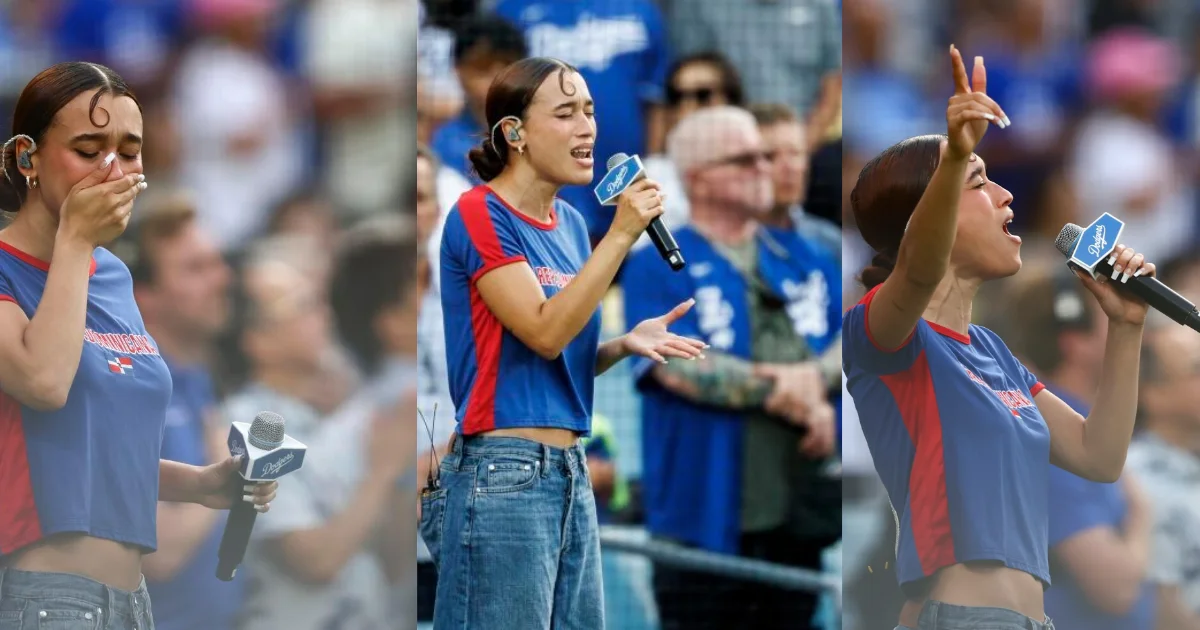Channel your inner Vogue and Confidence!

On the evening of June 14, Vanessa Hernandez—better known to her fans as Nezza—walked onto the field at Dodger Stadium, ready to perform The Star-Spangled Banner. What happened next wasn’t just a performance—it was a statement. Dressed in elegance and courage, Nezza took the mic and sang the national anthem in Spanish, a move so bold, so unapologetic, it split the stadium in half.
This wasn’t your average anthem moment. It was fiery. It was powerful. And it was instantly controversial.
The reaction? Instant fireworks—before the game even began. Some fans cheered. Others gasped. Phones were whipped out, hashtags went wild, and within minutes, “Vanessa Hernandez national anthem” and “Nezza Spanish Anthem” were trending nationwide.
Sources close to the team say the Dodgers organization had explicitly objected to the Spanish version beforehand. But Nezza wasn’t about to shrink. She didn’t come to blend in. She came to represent. And she did—flawlessly.
By choosing to sing the national anthem in Spanish, Nezza reignited a long-standing conversation about who gets to be heard in America—and in what language.
This wasn’t about disrespecting the country. It was about honoring the millions of Spanish-speaking Americans who call the United States home. In a city as diverse as Los Angeles, where Latino identity pulses through the culture, Nezza’s performance wasn’t a rebellion—it was a reminder.
A reminder that patriotism doesn’t come in one language.
The Dodgers, according to reports, were not pleased. Some insiders claim team executives were “blindsided” and considered pulling the plug mid-performance. But Nezza had already delivered the knockout. The crowd had witnessed history.
Vanessa Hernandez has since remained poised, letting the moment speak louder than any press release. She hasn’t issued a formal statement—because, frankly, she doesn’t need to.
Celebs from all corners are chiming in. Musicians are calling it “the most powerful anthem since Whitney.” Activists are praising it as “a revolution in three minutes.” And the internet? It’s gone full blaze.
Nezza has long walked the line between music and movement. Her fan base is well aware of her as a fearless speaker, and this small instance only made her more- a symbol of cultural resistance wreathed with grace.
By changing the traditional pre-game song, the national anthem, to Spanish, she transformed the experience of becoming hyper-visible, expressing Latino pride, and unleashing unbridled Latino strength.
Los Angeles is home to one of the largest Spanish-speaking populations in the U.S. If there’s any stadium where this was bound to happen, it was Dodger Stadium. And Nezza made sure the world noticed.
Some will say it was controversial. Some will say it was inappropriate. But no one can say it didn’t matter.
Vanessa Hernandez, by choosing to sing in Spanish, reminded us that national identity isn’t monolingual. That representation isn’t radical—it’s necessary. That a young woman with a mic can still make power tremble and people listen.
In a time when cultural expression is being policed more than ever, Nezza’s voice cut through the noise. Her performance was a protest, a poem, and a power move—all rolled into one.
Whether the Dodgers issue a statement, whether more artists follow suit, whether fans rage or rejoice—one thing’s clear: this moment is etched into pop culture history.
Vanessa Hernandez sang the national anthem in Spanish, and the stadium will never forget it.
Want more raw takes, bold moves, and voices that shake up the norm? Keep your eyes locked on Vogue Vocal, where culture meets controversy, and stories like this don’t get lost in translation.

Are the men in house ready to take their style game up a notch? Aly at Vogue Vocal is the eyes and ears of entertainment industry with that Gen-Z x-factor! Aly’s personal style statement raises the bar high and knocks it out of the park so trust him for picking the best for Vocal Fashion, our e-magazine edit, the heart and soul of Vogue Vocal!